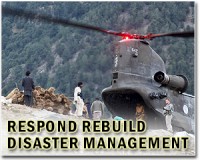| . |  |
. |
Khairpur Nathanshah, Pakistan (AFP) Dec 15, 2010 Hajani Chandio broke down in tears when she came home after three months in a refugee camp following the catastrophic floods that ravaged Pakistan earlier this year. "My house looked like a huge rubbish dump. It was littered with rubbish and the smell was unbearable. I burst into tears, how can we live here? The children begged us to leave," said the mother of seven. Chandio's province of Sindh was one of the areas worst hit when monsoon rains ravaged a fifth of Pakistan in July and August, affecting 21 million people and consuming entire villages in the country's worst natural disaster. Large areas are still submerged under flood waters but UN refugee agency the UNHCR says Pakistani families are increasingly swapping life in the camps to go home, however bleak the conditions as winter sets in. For Chandio, the loss is all the more bitter because local residents suspect their town of Khairpur Nathanshah, 350 kilometres (220 miles) from Karachi, was flooded deliberately by local authorities who breached a canal to avoid even more extensive damage elsewhere. The family was one of thousands abruptly asked to go by local authorities in September, as flood waters bore down. "We were given just a few hours to leave. We couldn't take most of our belongings and valuables. There was a huge mess and the number of vehicles to escape were few and very expensive." Hajani's husband Allah Rakhio Chandio arranged a truck and took his family to Kotri, a southeast town 240 kilometres away. "That was the worst night of my life," said Allah Rakhio quietly. The UNHCR says the situation in Khairpur Nathanshah and surrounding villages is severe with flood waters still relatively high and some of the most severe damage to infrastructure in the south. Rehmatullah Colony was among the worst-affected neighbourhoods. The Chandios' house is one of the few with parts still identifiable. "That was the kitchen and here was our washroom," says the diminutive Hajani, gesturing towards fallen brickwork heaped in corners of the property. The house looks out onto flood water. Nearby sugarcane fields have become a virtual lake with boats bobbing on the surface. Allah Rakhio had a shop. But he returned to find a pile of bricks. And as at home, the looters had been. "I managed to get a bag of rice from my shop. It wasn't stolen because it was full of insects. It is the only thing at the moment to eat." With no job in sight, he spends each day in search of food. The onset of winter means temperatures can drop to five degrees Celsius (41 degrees Fahrenheit) at night. "It's becoming unbearable as we have just one room left with broken walls, which doesn't exactly give us a cosier sleep," he said. UNHCR told AFP by email that the number of families in refugee camps had "dramatically decreased... in recent weeks" with more people returning home. In Islamabad, UNHCR official Duniya Aslam Khan said there were still 133,000 people in 338 camps in Sindh, telling reporters that some of the most vulnerable displaced families will remain in the camp until the end of winter. For many who embark on the longed-for homecoming, joy quickly gives way to despair once they see the ruined town. "We are working on our own. You can see nobody helps us," said Ghulam Qadir, who has co-opted relatives into helping him reconstruct his home. With shovels and buckets, the group was hard at work. "No authorities help out, no organisation helps out," he said. Mukhtar Brohi, 40, a health worker from local charity Global Helpline, says the town has also been let down by the lack of parliamentary representation. "We don't have local representatives in the assemblies. They belong to other parts of Dadu district so they feel little pain for us," she said. "Time and again we get promises from public representatives that help is on the way and will arrive soon, but every time it proves to be a farce." Valerie Amos, the UN emergency relief coordinator, has said it could take another six to seven months before all the flood water recedes. The United Nations launched a two-billion-dollar appeal in September to help Pakistani flood victims, of which foreign donors have stumped up 50 percent. Allah Rakhio says that like other survivors, his family got a handout of 20,000 rupees (235 dollars) from the government. "I spent it on fares to go home. Now we're empty-handed," he said.
Share This Article With Planet Earth
Related Links Bringing Order To A World Of Disasters A world of storm and tempest When the Earth Quakes
 Clinton Haiti meeting moved due to unrest
Clinton Haiti meeting moved due to unrestPort-Au-Prince Dec 13, 2010 A meeting between UN envoy Bill Clinton and Haitian Prime Minister Jean Max Bellerive on Tuesday has been moved to the neighboring Dominican Republic because of the post-election unrest. "Given the unpredictability of the situation in Port-au-Prince, the Interim Haiti Recovery Commission (IHRC) has decided to hold its next board meeting in Santo Domingo," a statement said. Former US pres ... read more |
|
| The content herein, unless otherwise known to be public domain, are Copyright 1995-2010 - SpaceDaily. AFP and UPI Wire Stories are copyright Agence France-Presse and United Press International. ESA Portal Reports are copyright European Space Agency. All NASA sourced material is public domain. Additional copyrights may apply in whole or part to other bona fide parties. Advertising does not imply endorsement,agreement or approval of any opinions, statements or information provided by SpaceDaily on any Web page published or hosted by SpaceDaily. Privacy Statement |